实验3 类和对象_基础编程2
实验一:
代码:
button.hpp:
1 #pragma once 2 3 #include <iostream> 4 #include <string> 5 6 using std::string; 7 using std::cout; 8 9 // 按钮类 10 class Button { 11 public: 12 Button(const string &text); 13 string get_label() const; 14 void click(); 15 16 private: 17 string label; 18 }; 19 20 Button::Button(const string &text): label{text} { 21 } 22 23 inline string Button::get_label() const { 24 return label; 25 } 26 27 void Button::click() { 28 cout << "Button '" << label << "' clicked\n"; 29 }
windows.hpp:
1 #pragma once 2 #include "button.hpp" 3 #include <vector> 4 #include <iostream> 5 6 using std::vector; 7 using std::cout; 8 using std::endl; 9 10 // 窗口类 11 class Window{ 12 public: 13 Window(const string &win_title); 14 void display() const; 15 void close(); 16 void add_button(const string &label); 17 18 private: 19 string title; 20 vector<Button> buttons; 21 }; 22 23 Window::Window(const string &win_title): title{win_title} { 24 buttons.push_back(Button("close")); 25 } 26 27 inline void Window::display() const { 28 string s(40, '*'); 29 30 cout << s << endl; 31 cout << "window title: " << title << endl; 32 cout << "It has " << buttons.size() << " buttons: " << endl; 33 for(const auto &i: buttons) 34 cout << i.get_label() << " button" << endl; 35 cout << s << endl; 36 } 37 38 void Window::close() { 39 cout << "close window '" << title << "'" << endl; 40 buttons.at(0).click(); 41 } 42 43 void Window::add_button(const string &label) { 44 buttons.push_back(Button(label)); 45 }
task1.cpp:
1 #include "window.hpp" 2 #include <iostream> 3 4 using std::cout; 5 using std::cin; 6 7 void test() { 8 Window w1("new window"); 9 w1.add_button("maximize"); 10 w1.display(); 11 w1.close(); 12 } 13 14 int main() { 15 cout << "用组合类模拟简单GUI:\n"; 16 test(); 17 }
运行结果: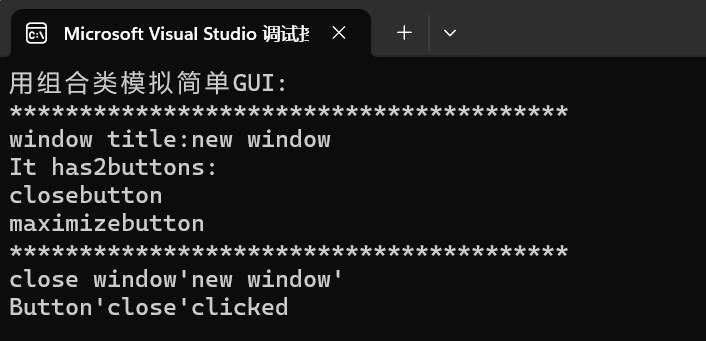
问题1:自定义了两个类,用了标准库的vector类;window类包含vector数组,数组元素类型为button对象。
问题2:不适合,const是为了保证数据不被修改,而inline是为了让函数内联,加快程序运行速度。
问题3:定义一个字符串s,其内容为40个*。
实验二:
代码:
1 #include <iostream> 2 #include <vector> 3 4 using namespace std; 5 6 void output1(const vector<int> &v) { 7 for(auto &i: v) 8 cout << i << ", "; 9 cout << "\b\b \n"; 10 } 11 12 void output2(const vector<vector<int>> v) { 13 for(auto &i: v) { 14 for(auto &j: i) 15 cout << j << ", "; 16 cout << "\b\b \n"; 17 } 18 } 19 20 void test1() { 21 vector<int> v1(5, 42); 22 const vector<int> v2(v1); 23 24 v1.at(0) = -999; 25 cout << "v1: "; output1(v1); 26 cout << "v2: "; output1(v2); 27 cout << "v1.at(0) = " << v1.at(0) << endl; 28 cout << "v2.at(0) = " << v2.at(0) << endl; 29 } 30 31 void test2() { 32 vector<vector<int>> v1{{1, 2, 3}, {4, 5, 6, 7}}; 33 const vector<vector<int>> v2(v1); 34 35 v1.at(0).push_back(-999); 36 cout << "v1: \n"; output2(v1); 37 cout << "v2: \n"; output2(v2); 38 39 vector<int> t1 = v1.at(0); 40 cout << t1.at(t1.size()-1) << endl; 41 42 const vector<int> t2 = v2.at(0); 43 cout << t2.at(t2.size()-1) << endl; 44 } 45 46 int main() { 47 cout << "测试1:\n"; 48 test1(); 49 50 cout << "\n测试2:\n"; 51 test2(); 52 }
运行结果: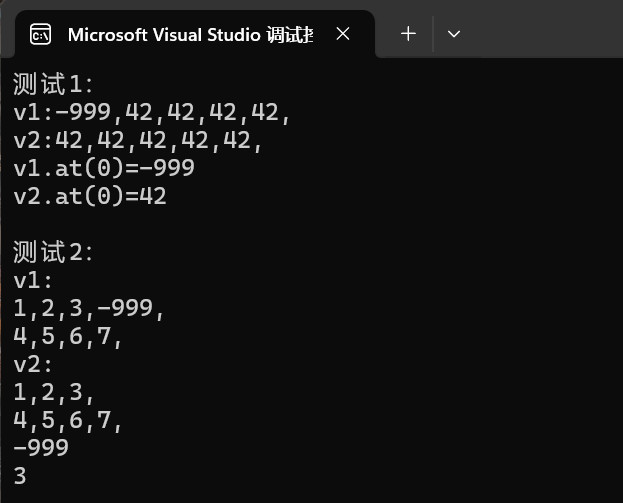
问题1:第一行是构造vector数组v1,类型为整型,初始有5个元素,每个元素都是42;第二行是构造vector数组v2,类型为整型,内容复制v1;第三行是用vector数组的at()函数,索引vector数组0号位置的元素,将其改为-999。
问题2:第一行是构造vector数组v1,类型为vector整型数组类型,第一个vector数组元素赋值为1,2,3。第二个vector数组元素赋值为4,5,6,7;第二行是构造vector数组v2,类型为vector整型数组类型,内容复制v1,并且不可以修改;第三行是索引v1数组0号元素,将-999插入末尾。
问题3:第一行是构造vector整型数组t1,内容为v1数组的首个元素;第二行是输出t1的末尾元素并换行;第三行是构造vector整型数组t2,内容为v2的首个元素,并且不可以修改;第四行是输出t2的末尾元素并换行。
问题4:(1)深复制,因为改变被复制对象的元素,复制对象的元素不会跟着改变。
(2)需要,因为有时使用at不需要改变其值,只需要输出值,此时用const成员函数可以保证值不会被改变。
实验三:
代码:
vectorInt.hpp:
1 #pragma once 2 3 #include <iostream> 4 #include <cassert> 5 6 using std::cout; 7 using std::endl; 8 9 // 动态int数组对象类 10 class vectorInt{ 11 public: 12 vectorInt(int n); 13 vectorInt(int n, int value); 14 vectorInt(const vectorInt &vi); 15 ~vectorInt(); 16 17 int& at(int index); 18 const int& at(int index) const; 19 20 vectorInt& assign(const vectorInt &v); 21 int get_size() const; 22 23 private: 24 int size; 25 int *ptr; // ptr指向包含size个int的数组 26 }; 27 28 vectorInt::vectorInt(int n): size{n}, ptr{new int[size]} { 29 } 30 31 vectorInt::vectorInt(int n, int value): size{n}, ptr{new int[size]} { 32 for(auto i = 0; i < size; ++i) 33 ptr[i] = value; 34 } 35 36 vectorInt::vectorInt(const vectorInt &vi): size{vi.size}, ptr{new int[size]} { 37 for(auto i = 0; i < size; ++i) 38 ptr[i] = vi.ptr[i]; 39 } 40 41 vectorInt::~vectorInt() { 42 delete [] ptr; 43 } 44 45 const int& vectorInt::at(int index) const { 46 assert(index >= 0 && index < size); 47 48 return ptr[index]; 49 } 50 51 int& vectorInt::at(int index) { 52 assert(index >= 0 && index < size); 53 54 return ptr[index]; 55 } 56 57 vectorInt& vectorInt::assign(const vectorInt &v) { 58 delete[] ptr; // 释放对象中ptr原来指向的资源 59 60 size = v.size; 61 ptr = new int[size]; 62 63 for(int i = 0; i < size; ++i) 64 ptr[i] = v.ptr[i]; 65 66 return *this; 67 } 68 69 int vectorInt::get_size() const { 70 return size; 71 }
task3.cpp:
1 #include "vectorInt.hpp" 2 #include <iostream> 3 4 using std::cin; 5 using std::cout; 6 7 void output(const vectorInt &vi) { 8 for(auto i = 0; i < vi.get_size(); ++i) 9 cout << vi.at(i) << ", "; 10 cout << "\b\b \n"; 11 } 12 13 14 void test1() { 15 int n; 16 cout << "Enter n: "; 17 cin >> n; 18 19 vectorInt x1(n); 20 for(auto i = 0; i < n; ++i) 21 x1.at(i) = i*i; 22 cout << "x1: "; output(x1); 23 24 vectorInt x2(n, 42); 25 vectorInt x3(x2); 26 x2.at(0) = -999; 27 cout << "x2: "; output(x2); 28 cout << "x3: "; output(x3); 29 } 30 31 void test2() { 32 const vectorInt x(5, 42); 33 vectorInt y(10, 0); 34 35 cout << "y: "; output(y); 36 y.assign(x); 37 cout << "y: "; output(y); 38 39 cout << "x.at(0) = " << x.at(0) << endl; 40 cout << "y.at(0) = " << y.at(0) << endl; 41 } 42 43 int main() { 44 cout << "测试1: \n"; 45 test1(); 46 47 cout << "\n测试2: \n"; 48 test2(); 49 }
运行结果: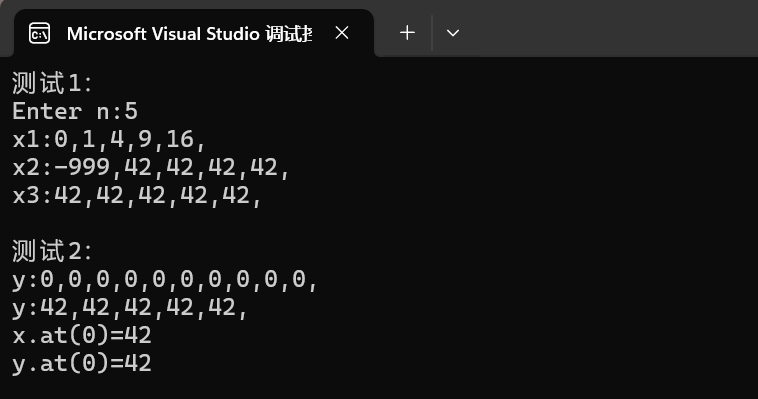
问题1:深复制。
问题2:不能,因为&代表引用,返回值引用原来的对象的成员,如果修改对象的成员也会跟着改变,达到目的,如果去掉就无法成功改变值。const去掉会有安全隐患,因为const表明他的返回值是const int类型,不能修改。
问题3:不能,因为返回值是引用被复制后的vectorInt对象,是原来的被改变的对象,如果去掉就返回一个新的复制的对象。会占用多于内存。
实验四:
代码:
matrix.hpp:
1 #pragma once 2 3 #include<iostream> 4 #include<cassert> 5 6 using std::cout; 7 using std::endl; 8 9 class Matrix { 10 public: 11 Matrix(int n, int m); 12 Matrix(int n); 13 Matrix(const Matrix& x); 14 ~Matrix(); 15 16 void set(const double* pvalue); 17 void clear(); 18 19 const double& at(int i, int j)const; 20 double& at(int i, int j); 21 22 int get_lines()const; 23 int get_cols()const; 24 25 void display()const; 26 27 private: 28 int lines; 29 int cols; 30 double* ptr; 31 }; 32 33 Matrix::Matrix(int n, int m) :lines{ n }, cols{ m } { 34 ptr = new double [n*m]; 35 } 36 37 Matrix::Matrix(int n) :lines{ n }, cols{ n } { 38 ptr = new double[n * n]; 39 } 40 41 Matrix::Matrix(const Matrix& x) { 42 lines = x.lines; 43 cols = x.cols; 44 ptr = new double[lines * cols]; 45 for (int i = 0; i < lines * cols; i++) 46 ptr[i] = x.ptr[i]; 47 } 48 49 Matrix::~Matrix() { 50 delete[]ptr; 51 } 52 53 void Matrix::set(const double* pvalue) { 54 for (int i = 0; i < lines * cols; i++) { 55 ptr[i] = pvalue[i]; 56 } 57 } 58 59 void Matrix::clear() { 60 for (int i = 0; i < lines * cols; i++) { 61 ptr[i] = 0; 62 } 63 } 64 65 const double& Matrix::at(int i, int j)const { 66 return ptr[i * cols + j]; 67 } 68 69 double& Matrix::at(int i, int j) { 70 return ptr[i * cols + j]; 71 } 72 73 int Matrix::get_lines()const { 74 return lines; 75 } 76 77 int Matrix::get_cols()const { 78 return cols; 79 } 80 81 void Matrix::display()const { 82 for (int i = 0; i < lines * cols; i++) { 83 if ((i + 1) % cols != 0) 84 cout << ptr[i] << " ,"; 85 else 86 cout << ptr[i] << endl; 87 } 88 }
task4.cpp:
1 #include"matrix.hpp" 2 #include<iostream> 3 #include<cassert> 4 5 using std::cin; 6 using std::cout; 7 using std::endl; 8 9 const int N = 1000; 10 11 void output(const Matrix& m, int index) { 12 assert(index >= 0 && index < m.get_lines()); 13 14 for (auto j = 0; j < m.get_cols(); j++) 15 cout << m.at(index, j) << ","; 16 cout << "\b\b\n"; 17 } 18 19 void test1() { 20 double x[1000] = { 5,6,7,8,9,10,11,12,13,14 }; 21 22 int n, m; 23 cout << "Enter n and m:"; 24 cin >> n >> m; 25 26 Matrix m1(n, m); 27 m1.set(x); 28 29 Matrix m2(m, n); 30 m2.set(x); 31 32 Matrix m3(2); 33 m3.set(x); 34 35 cout << "矩阵对象m1:\n"; m1.display(); cout << endl; 36 cout << "矩阵对象m2:\n"; m2.display(); cout << endl; 37 cout << "矩阵对象m3:\n"; m3.display(); cout << endl; 38 } 39 40 void test2() { 41 Matrix m1(2, 3); 42 m1.clear(); 43 44 const Matrix m2(m1); 45 m1.at(0, 0) = -999; 46 47 cout << "m1.at(0,0)=" << m1.at(0, 0) << endl; 48 cout << "m2.at(0,0)=" << m2.at(0, 0) << endl; 49 cout << "矩阵对象m1第0行:"; output(m1, 0); 50 cout << "矩阵对象m2第0行:"; output(m2, 0); 51 } 52 53 int main() { 54 cout << "测试1:\n"; 55 test1(); 56 57 cout << "测试2:\n"; 58 test2(); 59 }
运行结果:
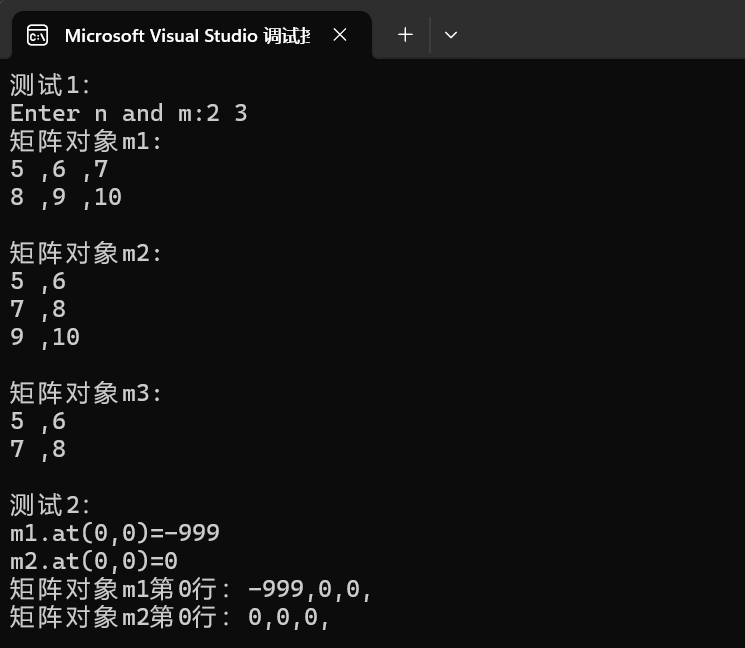
实验五:
代码:
user.hpp:
1 #pragma once 2 #include<iostream> 3 #include<string> 4 5 using namespace std; 6 7 class User { 8 public: 9 User(string n) :name{ n } { 10 password = "123456"; 11 email = " "; 12 } 13 User(string n, string p, string e) :name{ n }, password{ p }, email{ e } { 14 } 15 16 void set_email() { 17 int judge = 0; 18 string e; 19 cout << "请输入邮箱:"; 20 while(judge!=1){ 21 cin >> e; 22 for (char i : e) { 23 if (i == '@') { 24 judge = 1; 25 break; 26 } 27 } 28 if (judge == 1)break; 29 else 30 cout << "不是合法邮箱,请重新输入:"; 31 } 32 email = e; 33 cout << "邮箱设置成功"<<endl; 34 } 35 36 void change_password() { 37 int times=0; 38 string oldp,newp; 39 cout << "输入旧密码:"; 40 do { 41 cin >> oldp; 42 if (oldp == password) 43 break; 44 else times++; 45 cout << "密码错误,请重新输入密码:"; 46 if (times == 3) { 47 cout << "连续三次输入错误,请稍后再试" << endl; 48 return; 49 } 50 } while (true); 51 cout << "请输入新密码:"; 52 cin >> newp; 53 password = newp; 54 cout << "新密码设置成功" << endl; 55 } 56 57 void display() { 58 int length = 0; 59 length = password.size(); 60 string protection(length, '*'); 61 cout << "name: " << name << endl; 62 cout << "pass: " << protection << endl; 63 cout << "email: " << email << endl; 64 cout << endl; 65 } 66 private: 67 string name, password, email; 68 };
task5.cpp:
1 #include"user.hpp" 2 #include<iostream> 3 #include<vector> 4 #include<string> 5 6 using std::cin; 7 using std::cout; 8 using std::endl; 9 using std::vector; 10 using std::string; 11 12 void test() { 13 vector<User>user_1st; 14 15 User u1("Alice", "2024113", "Alice@hotmail.com"); 16 user_1st.push_back(u1); 17 cout << endl; 18 19 User u2("Bob"); 20 u2.set_email(); 21 u2.change_password(); 22 user_1st.push_back(u2); 23 cout << endl; 24 25 User u3("Hellen"); 26 u3.set_email(); 27 u3.change_password(); 28 user_1st.push_back(u3); 29 cout << endl; 30 31 cout << "There are" << user_1st.size() << "users.they are::" << endl; 32 for (auto& i : user_1st) { 33 i.display(); 34 cout << endl; 35 } 36 } 37 38 int main() { 39 test(); 40 }
运行结果:
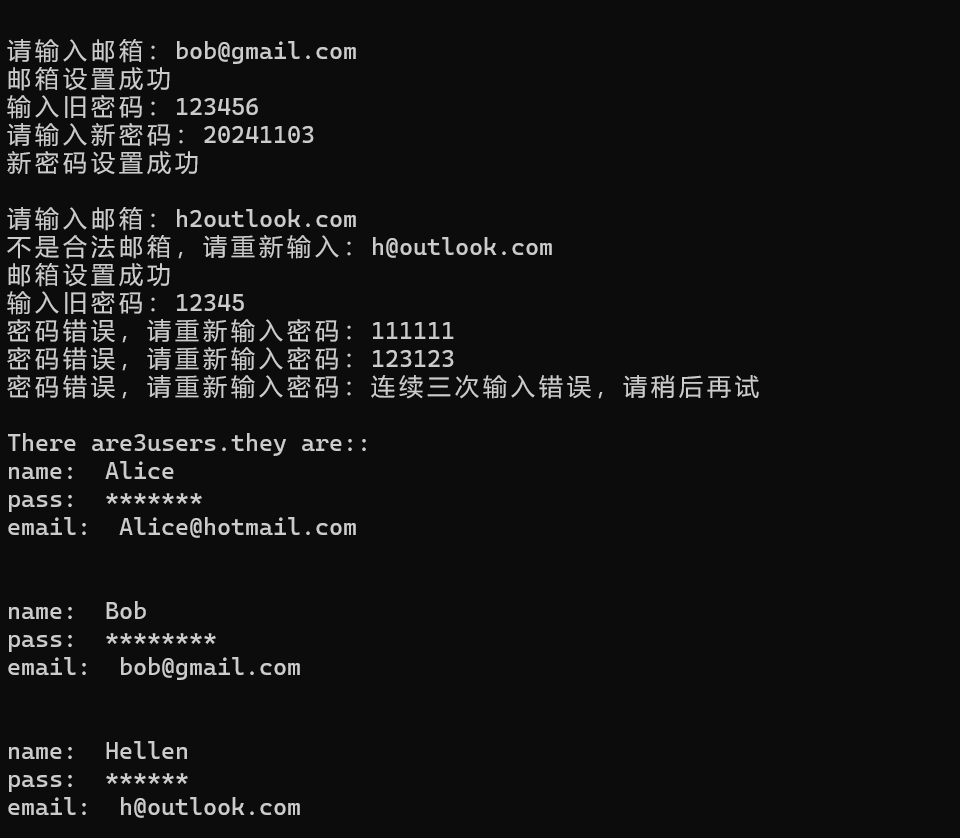
实验六:
代码:
date.h:
1 #pragma once 2 #ifndef DATE H 3 #define DATE H 4 class Date { 5 private: 6 int year; 7 int month; 8 int day; 9 int totalDays; 10 public: 11 Date(int year, int month, int day); 12 int getYear()const { return year; } 13 int getMonth()const { return month; } 14 int getDay()const { return day; } 15 int getMaxDay()const; 16 bool isLeapYear()const { 17 return year % 4 == 0 && year % 100 != 0 || year % 400 == 0; 18 } 19 void show()const; 20 int distance(const Date& date)const { 21 return totalDays - date.totalDays; 22 } 23 }; 24 #endif //DATE H
date.cpp:
1 #include"date.h" 2 #include<iostream> 3 #include<cstdlib> 4 using namespace std; 5 namespace { 6 const int DAYS_BEFORE_MONTH[] = { 0,31,59,90,120,151,181,212,243,273,304,334,365 }; 7 } 8 Date::Date(int year, int month, int day) :year{ year }, month{ month }, day{ day } { 9 if (day <= 0 || day > getMaxDay()) { 10 cout << "Invalid date:"; 11 show(); 12 cout << endl; 13 exit(1); 14 } 15 int years = year - 1; 16 totalDays = years * 365 + years / 4 - years / 100 + years / 400 + DAYS_BEFORE_MONTH[month - 1] + day; 17 if (isLeapYear() && month > 2)totalDays++; 18 } 19 int Date::getMaxDay()const { 20 if (isLeapYear() && month == 2) 21 return 29; 22 else 23 return DAYS_BEFORE_MONTH[month] - DAYS_BEFORE_MONTH[month - 1]; 24 } 25 void Date::show()const { 26 cout << getYear() << "-" << getMonth() << "-" << getDay(); 27 }
account.h:
1 #pragma once 2 #ifndef ACCOUNT H 3 #define ACCOUNT H 4 #include"date.h" 5 #include<string> 6 class SavingsAccount { 7 private: 8 std::string id; 9 double balance; 10 double rate; 11 Date lastDate; 12 double accumulation; 13 static double total; 14 15 void record(const Date& date, double amount, const std::string& desc); 16 17 void error(const std::string& msg)const; 18 19 double accumulate(const Date& date)const { 20 return accumulation + balance * date.distance(lastDate); 21 } 22 public: 23 SavingsAccount(const Date& date, const std::string& id, double rate); 24 const std::string& getId()const { return id; } 25 double getBalance()const { return balance; } 26 double getRate()const { return rate; } 27 static double getTotal() { return total; } 28 29 void deposit(const Date& date, double amount, const std::string& desc); 30 31 void withdraw(const Date& date, double amount, const std::string& desc); 32 33 void settle(const Date& date); 34 35 void show()const; 36 }; 37 #endif// ACCOUNT H
account.cpp:
1 #include"account.h" 2 #include<iostream> 3 #include<cmath> 4 using namespace std; 5 double SavingsAccount::total = 0; 6 7 SavingsAccount::SavingsAccount(const Date& date, const string& id, double rate) :id{ id }, balance{ 0 }, rate{ rate }, lastDate{ date }, accumulation{ 0 } { 8 date.show(); 9 cout << "\t#" << id << "created" << endl; 10 } 11 12 void SavingsAccount::record(const Date& date, double amount, const string& desc) { 13 accumulation = accumulate(date); 14 lastDate = date; 15 amount = floor(amount * 100 + 0.5) / 100; 16 balance+= amount; 17 total += amount; 18 date.show(); 19 cout << "\t#" << id << "\t" << amount << "\t" << balance << "\t" << desc << endl; 20 } 21 22 void SavingsAccount::error(const string& msg)const { 23 cout << "Error(#" << id << "):" << msg << endl; 24 } 25 26 void SavingsAccount::deposit(const Date& date, double amount, const string& desc) { 27 record(date, amount, desc); 28 } 29 30 void SavingsAccount::withdraw(const Date& date, double amount, const string& desc) { 31 if (amount > getBalance()) 32 error("not enough money"); 33 else 34 record(date, -amount, desc); 35 } 36 37 void SavingsAccount::settle(const Date& date) { 38 double interest = accumulate(date) * rate / date.distance(Date(date.getYear() - 1, 1, 1)); 39 if (interest != 0) 40 record(date, interest, "interest"); 41 accumulation = 0; 42 } 43 44 void SavingsAccount::show()const { 45 cout << id << "\tBalance:" << balance; 46 }
6_25.cpp:
1 #include"account.h" 2 #include<iostream> 3 using namespace std; 4 int main() { 5 Date date(2008, 11, 1); 6 7 SavingsAccount accounts[] = { 8 SavingsAccount(date,"03755217",0.015),SavingsAccount(date,"02342342",0.015) 9 }; 10 const int n = sizeof(accounts) / sizeof(SavingsAccount); 11 12 accounts[0].deposit(Date(2008, 11, 5), 5000, "salary"); 13 accounts[1].deposit(Date(2008, 11, 25), 10000, "sell stock 0323"); 14 15 accounts[0].deposit(Date(2008, 12, 5), 5500, "salary"); 16 accounts[1].withdraw(Date(2008, 12, 20), 4000, "buy a laptop"); 17 18 cout << endl; 19 for (int i = 0; i < n; i++) { 20 accounts[i].settle(Date(2009, 1, 1)); 21 accounts[i].show(); 22 cout << endl; 23 } 24 cout << "Total:" << SavingsAccount::getTotal() << endl; 25 return 0; 26 }
运行结果:
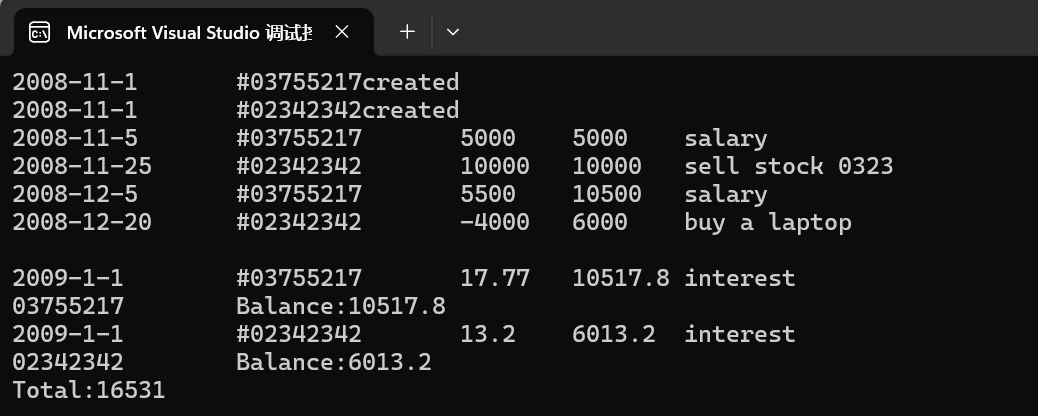



 浙公网安备 33010602011771号
浙公网安备 33010602011771号